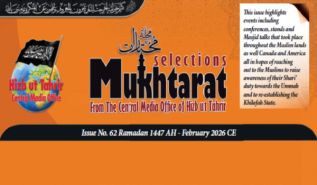بسم الله الرحمن الرحيم
Reflections Upon Surah Al-Asr
(Translated)
https://www.al-waie.org/archives/article/19951
Al Waie Magazine Issue 469
The Thirty-Ninth Year, Safar 1447 AH, corresponding to August 2025 CE
Allah (swt) says,
[وَٱلۡعَصۡرِ ١ إِنَّ ٱلۡإِنسَٰنَ لَفِي خُسۡرٍ ٢ إِلَّا ٱلَّذِينَ ءَامَنُواْ وَعَمِلُواْ ٱلصَّٰلِحَٰتِ وَتَوَاصَوۡاْ بِٱلۡحَقِّ وَتَوَاصَوۡاْ بِٱلصَّبۡرِ]
“By Time * Indeed mankind is in loss * Except for those who have believed and done righteous deeds and advised each other to truth and advised each other to patience” [TMQ Surah Al-Asr 103: 1-3].
Rasim Abu Mamoon Khater
This Surah is Makkan, revealed before the Hijrah (migration). It contains three verses, making it one of the shortest chapters in the Qur’an, similar to Surah Al-Kawthar and Surah Al-Nasr. It is named Al-Asr (The Time) because Allah swears by Al-Asr, which refers to time or part of it. Although this Surah consists of only a few verses with short passages, it contains deep meanings, powerful indications, and eloquent expressions. It encapsulates the path of Islam, its fundamentals, and the pillars of the Deen. It includes the bodies of knowledge and purposes of the Noble Quran in the most concise manner and with the finest expression. It outlines the happiness or misery of humanity, pointing out the reasons for success and failure. Imam Al-Shafi’i, may Allah have mercy on him, said, لو ما أنزل الله حجة على خلقه إلا هذه السورة لكفتهم “If Allah had revealed no evidence to His creation except this Surah, it would have been sufficient for them.”
Reflecting on this Surah, we derive the following insights:
1.[وَٱلۡعَصۡرِ]“By Time”this is an oath, but why does our Lord (swt) swear an oath? Is it to make us believe Him? The answer is, of course, no, because Allah is al-Haq (the Truth) and only speaks the truth. He swears to draw our attention to the importance of what He (swt) is saying and to emphasize the significance of the message. This is an evocative introduction to the Surah, where Allah (swt) begins with an oath, a form of confirmation, indicating the importance of what follows. So, an oath indicates the significance of what is to come, drawing attention to and highlighting its importance. Allah (swt) swears by time because of its significance, to clarify its standing, and to exalt its value. Time holds many wonders: one nation rises while another falls, fate unfolds, and signs appear, yet Allah (swt) remains unchanged, the night follows the day, and the day follows the night.
2: The definite article “Al” in “al-Insan” refers to universality, meaning, every human is in loss. This applies to all people, including the ruddy and the dark skinned, the rich and the poor, the Arab and the non-Arab. All are in loss, and the Surah confirms the complete loss for every individual. The Surah then presents two groups, one that is doomed to loss, and another that is exempt from this general loss. These are those whom Allah has exempted in the Surah.
3. Allah (swt) says,
[إِنَّ ٱلۡإِنسَٰنَ لَفِي خُسۡرٍ]
“Indeed all humans are in loss.” This means that each person is deeply immersed in loss, surrounded by it from every direction. This is more eloquent than simply saying, “The human has losses.” Loss is the opposite of profit and means destruction and decline. The loss here refers to entering Hell, earning the Wrath of the Almighty, being excluded from Paradise, and not receiving Allah’s (swt) Pleasure. The emphatic لَفِي “indeed in” implies being drowned in loss that surrounds him from all sides. Thus, the person must seek the way of salvation. The disbeliever, the munafiq, the mushrik, and the murtad (apostate) are all losers. Allah (swt) said,
[وَمَن يَتَّخِذِ ٱلشَّيۡطَٰنَ وَلِيّٗا مِّن دُونِ ٱللَّهِ فَقَدۡ خَسِرَ خُسۡرَانٗا مُّبِينٗا]
“And whoever takes Satan as an ally instead of Allah has certainly lost a clear loss” [TMQ Surah An-Nisa: 119]. He also says,
[وَخَسِرَ هُنَالِكَ ٱلۡكَٰفِرُونَ]
“And there, the disbelievers will be the ones who lose” [TMQ Surah Ghafir: 85] and
[وَمَن يَبۡتَغِ غَيۡرَ ٱلۡإِسۡلَٰمِ دِينٗا فَلَن يُقۡبَلَ مِنۡهُ وَهُوَ فِي ٱلۡأٓخِرَةِ مِنَ ٱلۡخَٰسِرِينَ]
“And whoever seeks a religion other than the Deen of Islam, it will never be accepted from him, and he, in the Hereafter, will be among the losers” [TMQ Surah Aal-e-Imran: 85].
4. Then Allah (swt) says,
[إِلَّا ٱلَّذِينَ ءَامَنُواْ وَعَمِلُواْ ٱلصَّٰلِحَٰتِ وَتَوَاصَوۡاْ بِٱلۡحَقِّ وَتَوَاصَوۡاْ بِٱلصَّبۡرِ]
“Except those who believe and do righteous deeds and advise one another to truth and advise one another to patience” [TMQ Surah Al-Asr: 3]. This is an exception from the general loss that affects every human, and none are safe from it except those who possess the qualities of faith, righteous actions, mutual advising to truth, and mutual advising to patience. The word [إِلَّا]“except” here is the means of salvation from loss. It involves,
a. Belief in everything that Allah has commanded,
[يَٰٓأَيُّهَا ٱلَّذِينَ ءَامَنُوٓاْ ءَامِنُواْ بِٱللَّهِ وَرَسُولِهِۦ وَٱلۡكِتَٰبِ ٱلَّذِي نَزَّلَ عَلَىٰ رَسُولِهِۦ وَٱلۡكِتَٰبِ ٱلَّذِيٓ أَنزَلَ مِن قَبۡلُۚ وَمَن يَكۡفُرۡ بِٱللَّهِ وَمَلَٰٓئِكَتِهِۦ وَكُتُبِهِۦ وَرُسُلِهِۦ وَٱلۡيَوۡمِ ٱلۡأٓخِرِ فَقَدۡ ضَلَّ ضَلَٰلَۢا بَعِيدًا]
“O you who have believed, believe in Allah and His Messenger and the Book which He sent down upon His Messenger and the Scriptures which He sent down before. And whoever denies Allah, His angels, His Books, His Messengers (as), and the Last Day has certainly gone far astray” [TMQ Surah An-Nisa: 136].
b. Righteous deeds: This includes all actions of goodness related to the rights of Allah (swt) and His servants, whether obligatory (wajib) or recommended (mustahab). Righteous deeds are those actions that follow the commands and avoid the prohibitions of the Shariah. The term [الصَّالِحَاتِ]“righteous deeds” refers to deeds of goodness in their totality. It covers three realms:
i. The relationship between the servant and his Lord, including beliefs and acts of worship like prayer, fasting, and supplication.
ii. The relationship of a person with themselves, such as clothing and food.
iii. The relationship between a person and others, including transactions and punishments.
Righteous deeds are the fruit of Iman, inseparable from it, and they are the beautiful and sweet results of that Iman.
For righteous deeds to be accepted by Allah, two conditions must be met:
i. The deed must be performed sincerely for the sake of Allah (swt) alone, as the Prophet (saw) said, «إنما الأعمال بالنيات، وإنما لكل امرئٍ ما نوى»“Actions are judged by intentions, and everyone will be rewarded according to what they intended” (Sahih Bukhari and Sahih Muslim). And he (saw) also said, »إِنَّ اللَّهَ لا يَقْبَلُ مِنْ الْعَمَلِ إِلا مَا كَانَ لَهُ خَالِصًا وَابْتُغِيَ بِهِ وَجْهُهُ«“Indeed, Allah does not accept any deed except that which is done sincerely for His sake and in accordance with His commands” (Narrated by An-Nasa'i).
ii. The deed must be consistent with the Sunnah,
[لِيَبۡلُوَكُمۡ أَيُّكُمۡ أَحۡسَنُ عَمَلٗاۚ]
“To test you to see which of you is best in deed” [TMQ Surah Al-Mulk: 2]. Imam Al-Razi explains, «أن يكون أخلص الأعمال وأصوبها؛ لأن العمل إذا كان خالصًا غير صواب لم يُقبَل، وكذلك إذا كان صوابًا غير خالص، فالخالص أن يكون لوجه الله تعالى، والصواب أن يكون على السنة» “The best deeds are the most sincere and the most correct. If an action is sincere but not correct, it will not be accepted. If it is correct but not sincere, it will also not be accepted. Sincerity means performing it for the sake of Allah (swt) alone. Correctness means it must be in accordance with the Sunnah.”
c. Allah (swt) says,
[وَتَوَاصَوۡاْ بِٱلۡحَقِّ]
“And they encouraged one another to the truth.” Tawaasee (mutual exhortation) means giving sincere advice. Deen is sincere advice, as the Prophet (saw) informed us when he said, «الدين النصيحة»“Deen is sincere advice.” They asked, “To whom, O Messenger of Allah?” He (saw) replied, «لله ولكتابه ولرسوله ولأئمة المسلمين وعامتهم»“To Allah, His Book, His Messenger, and to the leaders of the Muslims and to their common folk” (Reported by al-Bukhari and Muslim). Ali ibn Abi Talib (ra) said, «المؤمنون نَصَحَة والمنافقون غَشَشَة»“The believers are sincere advisors, and the hypocrites are deceivers.” Encouraging one another to the truth is part of righteous deeds. However, Allah (swt) mentioned it specifically due to its importance and to draw attention to it, since some people might assume that it is enough for salvation to merely have Iman and perform righteousness deeds, and that what happens to others does not concern them.
d. Allah (swt) says,
[وَتَوَاصَوۡاْ بِٱلصَّبۡرِ]
“And they advised one another to patience.” Just as we need mutual encouragement toward the truth, we also need mutual encouragement toward patience in upholding that truth. That includes patience in obeying Allah, patience in refraining from disobedience, and patience in enduring the painful trials and decree of Allah (swt). Although encouraging one another to patience is part of encouraging one another to the truth, Allah (swt) mentioned it separately to highlight its importance and the great impact it has on achieving salvation and avoiding loss. Mentioning patience after truth indicates that calling to the truth requires endurance and perseverance, and that callers to the truth and reformers are likely to face harm from tyrants and their followers. Therefore, they must be patient in carrying the message and enduring the harm they may face. The path of truth is not paved with roses and flowers, but surrounded by hardships, thorns, and barriers. Staying firm on the path of Truth requires beautiful patience and strong determination.
Surah Al-Asr also indicates the importance of enjoining good and forbidding evil, and that those who do so often face harm from others. Hence the necessity of encouraging one another to be patient. As Luqman (as) said to his son in advising him, as mentioned in the Quran,
[يَٰبُنَيَّ أَقِمِ ٱلصَّلَوٰةَ وَأۡمُرۡ بِٱلۡمَعۡرُوفِ وَٱنۡهَ عَنِ ٱلۡمُنكَرِ وَٱصۡبِرۡ عَلَىٰ مَآ أَصَابَكَۖ إِنَّ ذَٰلِكَ مِنۡ عَزۡمِ ٱلۡأُمُورِ ١٧]
“O my son, establish prayer, enjoin what is right, forbid what is wrong, and be patient over what befalls you. Indeed, that is of the matters [requiring] determination” [TMQ Surah Luqman: 17].
So, through the first two aspects, Iman and righteous deeds, a person perfects themselves. Through the last two, encouraging to truth and encouraging to patience, they help perfect others. By fulfilling all four, a person is saved from loss and attains great success.




